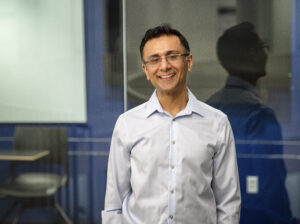
UMW Associate Professor of Business Kashef Majid is one of the 50 best undergraduate professors of 2024, honored by Poets&Quants. The annual list features accomplished, innovative and compassionate professors who “represent the best of what an undergraduate business degree can offer,” according to the online publication.
A standout professor with exceptional contributions in research and teaching, Majid has multiple awards in both areas, leaving a sustained and meaningful impact on his discipline, students and community.
“This is a highly selective distinction made by one of the most influential voices in business education today: Poets&Quants,” said UMW College of Business Dean Filiz Tabak. “Kashef’s research has uncovered important implications for businesses and policymakers, particularly in areas such as digital marketing, consumer liability and the sharing economy. His innovative teaching is also known for imparting cutting-edge, highly marketable skills to his students as well as bringing a strong sense of social responsibility and community engagement.”
As one example, he has developed an innovative Digital Marketing course through which students gain skills in digital marketing and AI tools in addition to obtaining the Google Analytics certification. And he developed a course called Alleviating Food Waste, which partners with local businesses to help them redeploy excess food resources in a way that benefits the community.
Majid also has established a robust and impactful research record, with articles in some of the most highly regarded publications in his discipline, including the Journal of Business Research, the Journal of International Business Policy, Tourism Management, the Journal of Product & Brand Management and the Journal of Services Marketing.
Nominator and colleague Associate Professor of Business Analytics and Associate Dean Christopher Garcia noted, “These not only demonstrate the quality and relevance of his work but also highlight his ability to address complex, interdisciplinary challenges. Moreover, his commitment to mentoring students and colleagues, leading to co-authored publications in peer-reviewed journals, further underscores his dedication to fostering a collaborative and intellectually stimulating academic environment.”
Majid has received numerous accolades for his outstanding research, including the Waple Fellowship Award at UMW, the 2021 Mary W. Pinschmidt Award for his significant impact on the lives of graduating students and a 2014 Innovative Digital Pedagogy Fellowship Award. He has been nominated for the AIB Haynes Award for the most promising researcher under the age of 40 and received the George Washington School of Business Board of Advisors Excellence Award for outstanding doctoral research and teaching. He earned a Ph.D. from The George Washington University, a master’s degree from Concordia University and a Bachelor of Commerce degree from the University of Ottawa.
“I was pretty late into my Ph.D. program at GWU when I realized I wanted to be a business school professor. I worked with wonderful faculty advisors who were great teachers but also doing impactful research. I saw becoming a professor as an opportunity to do work that contributed to those around me (similar to my advisors),” Majid said. He also cites colleagues at UMW such as Ken Machande, Robert Rycroft and the late Gwen Hale as inspiring him, giving him the freedom to teach courses on topics of interest and continuing to improve through teaching.
Now he leads by example and aims to create an engaging classroom experience. Class projects include community partners for applied learning and benefits. He finds students engaging in a variety of topics, noting that they are “humble – smart, hardworking and always seeking improvement.”
That description also fits Majid, who is known as a tough professor but with classes where the work is worth it.


Congratulations to Professor Kashef Majid on this well-deserved recognition! His innovative teaching and impactful research are an inspiration, making a lasting difference in both academia and the community